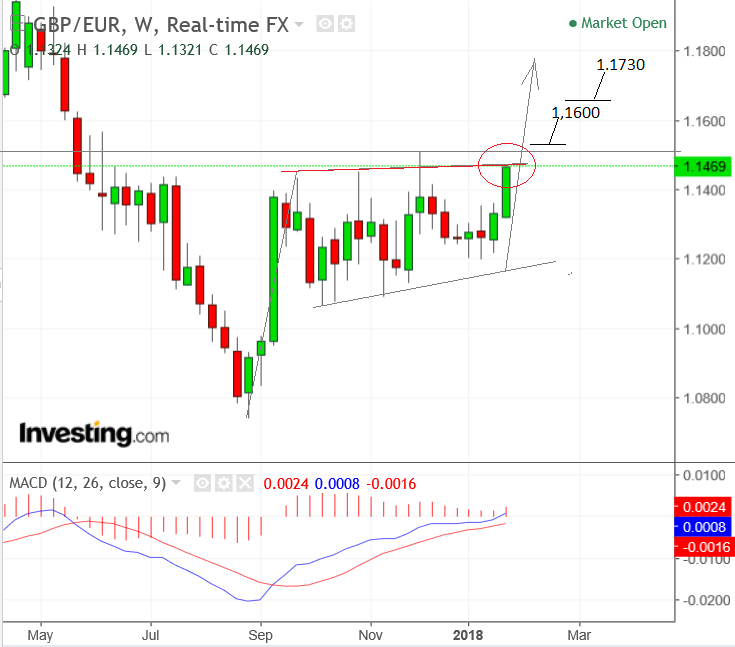The Pound's Rally vs. Euro will Live or Die on What the ECB says Today
- Written by: Gary Howes

Above: All eyes on the ECB President Mario Draghi and his team. (C) European Central Bank
The British Pound has risen to a make-or-break level against the Euro as we head into the key ECB meeting.
The GBP/EUR exchange rate trades at 1.15 at the time of writing, a shade below the key 1.1510 mark which represents the December 8 high where Sterling failed previously. The failure back in December ensured the exchange rate slumped back into a multi-week range that exists between 1.15 at the top and 1.11 at the bottom.
There is a therefore heightened risk that the current run of good fortune fails at this point again as a significant amount of sell orders are clustered around here. At the same time, should the move higher have enough conviction and these sell orders are overcome then the Pound will find itself in a bit of clear air that should allow more notable advances.
As our technical analyst Joaquin Monfort notes here, "we would want to see a break above the December 8 highs at 1.1510 for decisive confirmation that the upper border of the consolidation had been breached."
Failure to break above here could mean we head back down 1.11 again. Is this is an important technical juncture for Sterling and the Euro.
Be aware that at 12:30 GMT the European Central Bank convenes to give their latest policy decision - and how the meeting is interpreted could well set the tone for the Euro over coming weeks. Our coverage of the meeting can be found here.
A Euro-negative outcome to the event presents the Pound with its best shot at breaching the 1.1510 point.
According to Jasper Lawler at London Capital Group, the gains on a break out of the recent range could take the GBP/EUR exchange rate back towards the early 1.20s.
The analyst notes the Pound to be testing "critical" resistance at 1.1490-1.15, and a break above here invites a move to 1.2048.
Lawler has approached the analysis from the EUR/GBP angle:
Sterling probing 7-month highs vs the euro. EURGBP testing critical support near 0.87. Break could see drop to 0.83 pic.twitter.com/lOgIYfIpqP
— Jasper Lawler (@jasperlawler) January 25, 2018
What to Watch at the ECB Meeting
Investors have bought Euros through the course of 2017 in anticipation of the day the ECB finally turns off its printing machines that have been pumping money into the Eurozone economy for a number of years now.
This money printing - more formally known as the asset purchase programme - has kept the Euro suppressed, and expectations for its demise have boosted the Euro.
The only problem is that there is a distinct chance the ECB are now uncomfortable with the rise in value of the Euro as it makes Eurozone exports less competitive, and more importantly, creates downward pressure on inflation.
There is a distinct chance that the ECB push back against the rising Euro by 1) mentioning their discomfort with the exchange rate directly or 2) warning they will keep their asset purchase programme going for longer.
This will surely hurt the Euro and allow the Pound-to-Euro exchange rate a chance at piercing above 1.1510.
But, it's hard for the ECB to justify such as stance, after all the Eurozone economy is booming, as shown by yet another recent set of data which confirms growth is at its highest level for years.
This is simply not an economy that requires emergency assistance from he ECB. There is a real chance that should the ECB continue with this policy it risks creating another crisis later on down the line.
Therefore, the ECB's ability to push back against the Euro are limited.
If the markets get the sense that this is indeed the case, then we could well see the Euro pop higher and the Pound-to-Euro rate relegated back towards 1.13 and even 1.11.
"The burning question for FX markets at today’s ECB meeting is 'Will – and can – President Draghi talk the euro lower?' For the past week, we’ve argued that in the current environment – there is very little the ECB can do to stem the tide of a stronger EUR," says Viraj Patel, an analyst with ING.
Moreover, in a backdrop of broad Dollar weakness against all major currencies – and the EUR trade-weighted index (which matters more for the economy) in fact staying fairly stable within a narrow range since August – "there may be little macro-related impetus for the ECB to actively talk the Euro lower," adds Patel.
Advertisement
Get up to 5% more foreign exchange by using a specialist provider to get closer to the real market rate and avoid the gaping spreads charged by your bank when providing currency. Learn more here.





